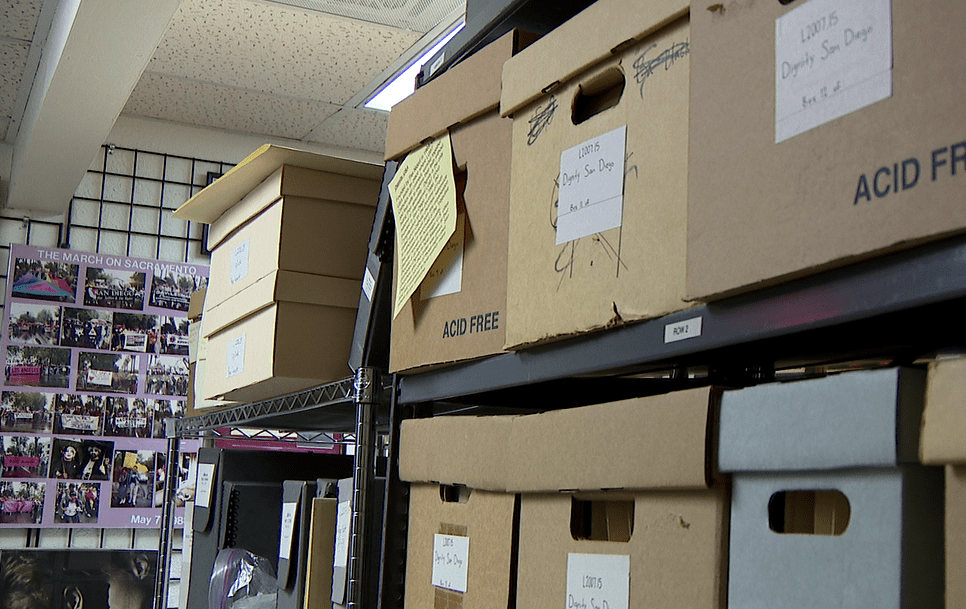Above: Nexstar’s video on the history of Pride Month.
SAN DIEGO (FOX 5/KUSI) — It’s the kind of place you could easily miss just walking down the streets of University Heights.
Tucked away behind the Diversionary Theatre, local history center Lambda Archives has been a staple of San Diego’s LGBTQ+ community for decades.
Though it’s lesser known than organizations like San Diego Pride or the San Diego LGBT Community Center, its role in the San Diego-Baja California region is crucial in documenting and preserving the legacy of LGBTQ+ residents.
Nicole Verdes, who uses the pronouns “they” and “she,” has been involved with the nonprofit since 2015, first as a volunteer and eventually working her way up to managing director.
Two 19th Century San Diego Icons Historians Think May Have Been Gay
Verdes’s path is that of nearly all of the History Center’s full-time staff, so-called “history nerds” who first joined the organization as volunteers, driven by their belief in its founding mission to preserve and collect artifacts related to the region’s vibrant LGBTQ+ history.
The movement was started nearly 40 years ago by Robert “Jess” Jessup, a gay Navy corpsman who served in the Vietnam War and was a pioneer of San Diego’s LGBTQ+ civil rights movement, and Doug Moore, known as the founder of San Diego Pride.
 Nicole Verdes adjusts Doug Moore’s Pride jacket, which has buttons from dozens of Pride events and is stored at the Lambda Archives in San Diego’s University Heights neighborhood. Lambda Archives is San Diego’s only history center dedicated to local LGBTQ+ history. (FOX 5/KUSI)
Nicole Verdes adjusts Doug Moore’s Pride jacket, which has buttons from dozens of Pride events and is stored at the Lambda Archives in San Diego’s University Heights neighborhood. Lambda Archives is San Diego’s only history center dedicated to local LGBTQ+ history. (FOX 5/KUSI)
Around 1987, during the height of the HIV/AIDS epidemic, the two began collecting personal items of people who had died to honor their stories and share them with others in the community.
“[Jessup] “He took the initiative to make sure these items, who these people were and their contributions were remembered,” Verdes said. “As part of that, he began collecting personal papers, photographs, protest signs, etc.”
Thus was born the San Diego Lesbian & Gay Archive, which later became the Lambda Archive, a tribute to the use of the Greek letter “lambda” as a symbol of change during the early “gay liberation movement.”
Today, the archive is considered one of the best-organized collections of LGBTQ+ history in the country, with everything from event flyers, books, journals, photographs, and zines housed on its shelves.
Much of what’s stored in the archives has been donated in various ways, but sorting through it all will take hours of sifting through paperwork and research, plus scanning and digitizing some items to make them available to the public.
The ephemera spans decades of San Diego’s LGBTQ+ history, dating back to the 1930s, and offers everything from a window into what everyday life was like in the community to San Diegans’ responses to landmark events like the HIV/AIDS epidemic and the Stonewall Riots.
But the running theme of any community-driven archive is simple: people.
“When people think about history, they think of these big events, these very large, historically significant events,” Verdes said, “but when you really analyze it, our history is made up of people and their experiences.”
“Certainly the collections housed here reflect who these individuals were, what their lives were like, the kind of people they were, what their contributions were, or how they lived in their local communities,” they continued.
Hearing these stories from the source, whether through interviews or listening to people recount their experiences in Lambda Archives’ oral history collections, is one of Verdes’ favorite parts of his work preserving the history of San Diego’s LGBTQ+ community.
“It’s really fascinating to sit across from someone and learn history as they tell you their story, their journey and how being part of a community has impacted them personally,” Verdes said.
Verdes says this is incredibly important work, not only to help a new generation navigate their world, but also to give new life to stories about LGBTQ+ people that are often overlooked or forgotten.
“When you really break it down, our history is made up of people and people’s experiences.”
Nicole Verdes, Managing Director, Lambda Archives
“Sometimes when people listen to our oral histories, there’s a common question at the end: ‘What is the end goal of this?'” Verdes says. “They can’t believe that their history won’t resurface in the future, but it does.”
That’s why education is central to Lambda Archives’ mission, according to Veldes: Learning about the past can strengthen communities and guide them into the future.
San Diego Pride Parade celebrates 50th anniversary this summer: How it all began
They explained that acknowledging and understanding the local history collected in the Lambda Archives – a history filled with hard-won victories and immense joy, as well as suffering and tragedy – can be an important tool in addressing current issues facing the LGBTQ+ community.
“it is [San Diego] This year’s Pride theme is ‘Making History Now,’ because that’s central to what we do here,” Verdes said. “History isn’t necessarily something from the distant past. It’s what’s actively happening today, the issues we’re facing, the events we’re hosting, the coalitions we’re building.”
“History is not always negative,” they say. “There can be great joy in events resurfacing.”


